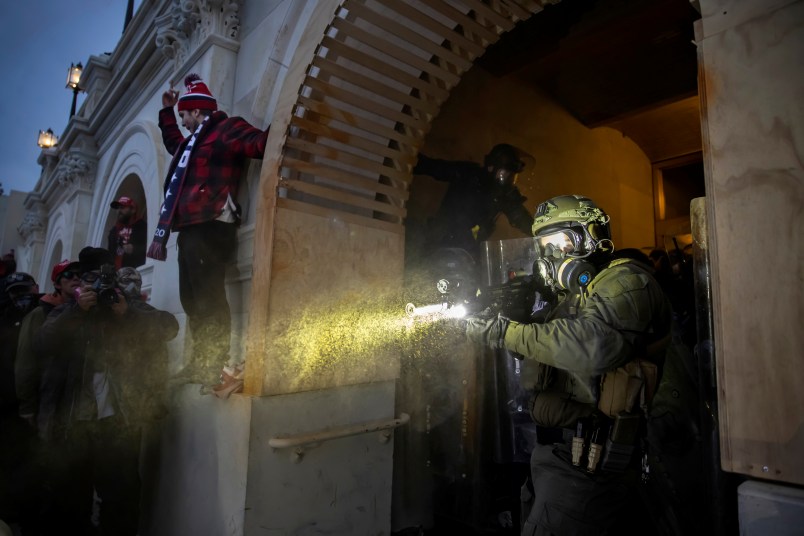So, where are those sedition charges?
That the question on some legal observers’ minds this week after months of investigation and criminal complaints related to the Jan. 6 attack on Congress.
It might not be such a relevant question if law enforcement officials had not spent so much time previewing charges of violating the paragraph-long “seditious conspiracy” statute. But they have, both on-record and anonymously.
The latest comes from The New York Times, which reported Monday that Justice Department officials were weighing charges against three alleged Oath Keepers who currently face charges of conspiring to obstruct Congress’ count of the Electoral College vote, among other violations.
Citing unnamed law enforcement officials briefed on DOJ deliberations, the Times reported that the Justice Department has been weighing whether to file sedition charges against the trio for weeks, and that the decision has stalled as Justice Department leaders wait on Senate confirmation.
Attorneys for the Capitol attackers in question have maintained their clients’ innocence, and one attorney for Donovan Crowl, Carmen Hernandez, even specifically told the Times that she’d seen no evidence to support a seditious conspiracy charge against Crowl.
That report followed a “60 Minutes” interview — an unauthorized one — in which the former acting U.S. attorney for the District of Columbia, Michael Sherwin, said he believed existing evidence was “trending” toward sedition charges.
Sherwin said essentially the same thing two months ago, when he was still the top federal prosecutor in D.C.
“We are closely looking at evidence related to the sedition charges,” Sherwin he told reporters on Jan. 26. “We are working on those cases, and I think the results will bear fruit very soon.”
But it’s not just Sherwin.
In a Jan. 24 filing arguing for the detention of Eric Munchel, the alleged Capitol attacker who earned the moniker “zip tie guy” for photos of him holding flex cuffs in the Senate chamber, prosecutors in Sherwin’s office wrote that “The evidence amassed so far subjects the defendant to felonies beyond that with which he has been charged so far, including obstructing Congress, interstate travel in furtherance of rioting activity, sedition, and other offenses.”
While Munchel and his mother, Lisa Eisenhart, are still in government custody, neither faces sedition charges.
The lack of sedition counts, at least thus far, is not necessarily a knock on prosecutors: The last time the federal government brought sedition charges was 10 years ago, against members of Michigan-based Christian militia group called Hutaree, The Washington Post noted. Those charges were eventually dismissed.
Before that, the so-called “Blind Sheikh” Omar Abdel Rahman and nine others were convicted of seditious conspiracy in 1995 for various terror plots.
By Tuesday, Judge Amit Mehta had called a hearing for the case involving several alleged Oath Keepers charged with conspiring to interrupt the Electoral College vote count. He was upset about the “60 Minutes” interview, and about The New York Times story.
“The government, in my view, should know better,” he said, while acknowledging that the prosecutors on the call hadn’t commented themselves.
Hernandez, Crowl’s attorney, said she apologized if the judge felt she was “out of line” for commenting to the Times, but added that she felt it was necessary to speak out given Sherwin’s comments.
“I thought the comments by Mr. Sherwin were very prejudicial,” she said.
“I did not find it problematic that you responded,” Mehta said, adding: “If the government begins making these sorts of statements to the media, whether attributed or anonymously, it is not surprising that defense counsel may be moved to want to respond publicly as well, and that’s exactly the situation we all want to avoid here.”







Perhaps the statute condemns only actions which rise to the level of “uppity.”
Just call 'em traitors and be done with it.
So much wrongitude.
A hall of mirrors of butthurt, self righteous ignorance, impotent rage, and childish logic—over donuts.